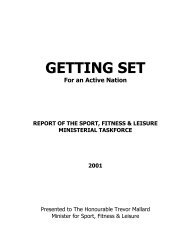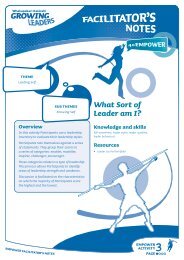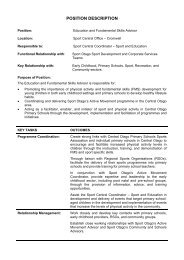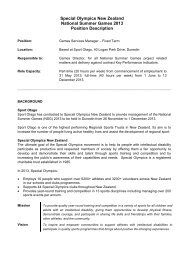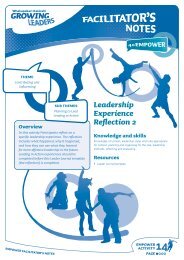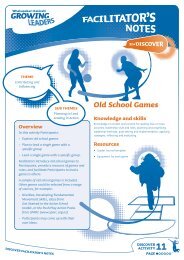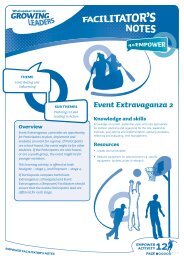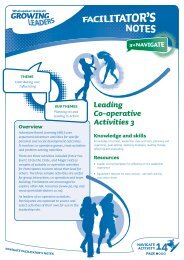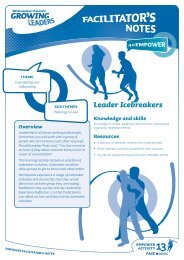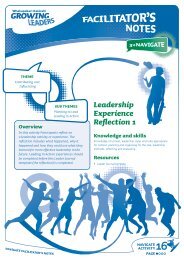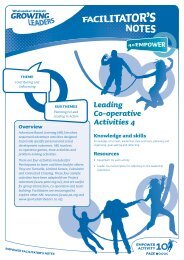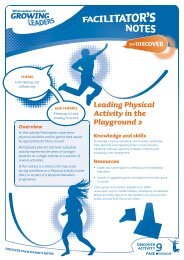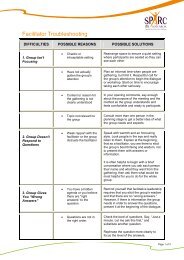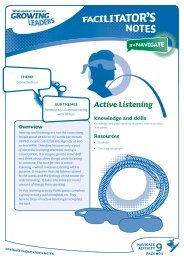An Overview - Sport New Zealand
An Overview - Sport New Zealand
An Overview - Sport New Zealand
Create successful ePaper yourself
Turn your PDF publications into a flip-book with our unique Google optimized e-Paper software.
THE VALUE OF SPORT<br />
1<br />
Foreword<br />
I am pleased to present this report on The Economic and Social Value of <strong>Sport</strong> to<br />
<strong>New</strong> <strong>Zealand</strong>: <strong>An</strong> <strong>Overview</strong> by Professor Paul Dalziel, Professor of Economics at the<br />
AERU Research Unit at Lincoln University.<br />
The work delivers on a commitment in SPARC’s 2009-2015 Strategic Plan to<br />
investigate and measure the value sport and recreation brings to the nation in terms<br />
of economic benefits, health savings and social and cultural gains.<br />
This new work has good foundations. It builds on and extends earlier work for<br />
SPARC’s predecessor, the Hillary Commission, by BERL (Business and Economic<br />
Research Ltd) and incorporates preliminary work for SPARC by NZIER. It also draws on<br />
and extends international studies. I thank Professor Dalziel for the considerable time<br />
and effort that has gone into this study.<br />
Professor Dalziel’s work shows that the sector is much larger and its contribution<br />
to GDP (Gross Domestic Product) substantially greater than previous studies have<br />
shown. The market value of sport and recreation to the <strong>New</strong> <strong>Zealand</strong> economy in<br />
2008/09 is estimated to be $5.2 billion, or 2.8 per cent of GDP. This puts the<br />
sector on a par with the dairy industry’s contribution to the <strong>New</strong> <strong>Zealand</strong> economy. 1<br />
The estimate of market value tells only part of the story. This new study shows that<br />
sport and active recreation result in gains in productivity and health benefits valued<br />
at $1.0 billion. Putting a dollar value on the personal benefits of participating in sport<br />
and recreation adds a further $6 billion, bringing Professor Dalziel’s overall estimate<br />
of the value of the sector to <strong>New</strong> <strong>Zealand</strong>ers to $12.2 billion.<br />
The study also estimates that the tax revenue from the sector is two and a half<br />
times that of government expenditure. This represents an excellent return on the<br />
Government’s investment.<br />
These are impressive figures and will provide sport and recreation organisations, local<br />
councils, commercial enterprises and government agencies with the hard facts they<br />
need to make sound investment decisions and leverage more resources. The results<br />
will also allow the sector to demonstrate how sport and recreation can help generate<br />
jobs, income, exports and sustainable local economies, and contribute to <strong>New</strong><br />
<strong>Zealand</strong>‘s international profile.<br />
SPARC knows that sport and recreation is not just about economic benefits and<br />
a companion report – Value of <strong>Sport</strong> and Recreation: Case Study of Northern<br />
United Rugby Football Club 2 – illustrates some of the personal and social values for<br />
individuals, families and communities from taking part in sport.<br />
Peter Miskimmin<br />
Chief Executive, SPARC<br />
1<br />
A 2010 study by NZIER estimated that the dairy sector<br />
accounts for 2.8% of GDP, or $5 billion.<br />
2<br />
This study was by Research <strong>New</strong> <strong>Zealand</strong> and the report<br />
is on SPARC’s website.



